Contraception after an abortion
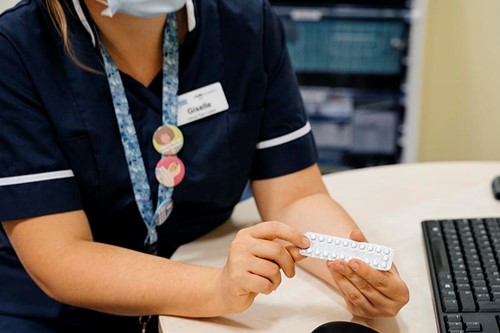
We offer contraception as part of your NHS-funded abortion treatment with MSI UK
Following an abortion, your fertility will return almost immediately. An egg can be released from the ovary as soon as five days after your treatment, so you could become pregnant again before your next period. If you would like to start a method of contraception following your abortion, we are here to help.
When accessing abortion services with MSI UK, you will have the opportunity to discuss contraception with our nurses. If you would like to start a method following your abortion treatment, we offer a range of short-acting contraceptive methods (such as the combined pill, the mini pill, the patch or the ring) and long-acting contraceptive methods (such as the coil, the injection or the implant) to suit your individual needs.
When can you start contraception following an abortion?
The best time to start contraception after your abortion depends on the contraceptive method.
The best time to have a LARC method (coil, implant or injection) is immediately after the pregnancy has passed. If this isn’t possible or you haven’t quite made up your mind about contraception, we can provide you with a short-term method (such as the mini pill) if you would like.
If you are collecting your abortion tablets in person you may be able to have your implant fitted at this time, please ask us if you are interested in this option.
If you are having a medical abortion and want to start taking the progestogen-only pill (mini pill), combined contraceptive pill, contraceptive patch or the contraceptive ring, you can start these methods the day after taking the second set of tablets.
The mini pill – the perfect ‘bridging method’
If you haven’t quite made up your mind about contraception, you may want to consider a temporary or ‘bridging’ method to get you from now until you get the method of your choice without putting you at risk of an unwanted pregnancy.
The mini pill is the perfect ‘bridging method’, due to how quickly it protects against pregnancy.
How quickly does contraception work following an abortion?
If you start any contraceptive method within five days of your abortion, you will be protected against pregnancy immediately.
A non-hormonal coil (also known as a ‘copper coil’) is always effective immediately.
The progesterone-only pill (also known as the ‘mini pill’) is always effective after 48 hours.
If you start any other methods (including the combined pill, the implant, the injection and the hormonal coil) after five days, you will need to use additional contraception (such as condoms) for seven days.
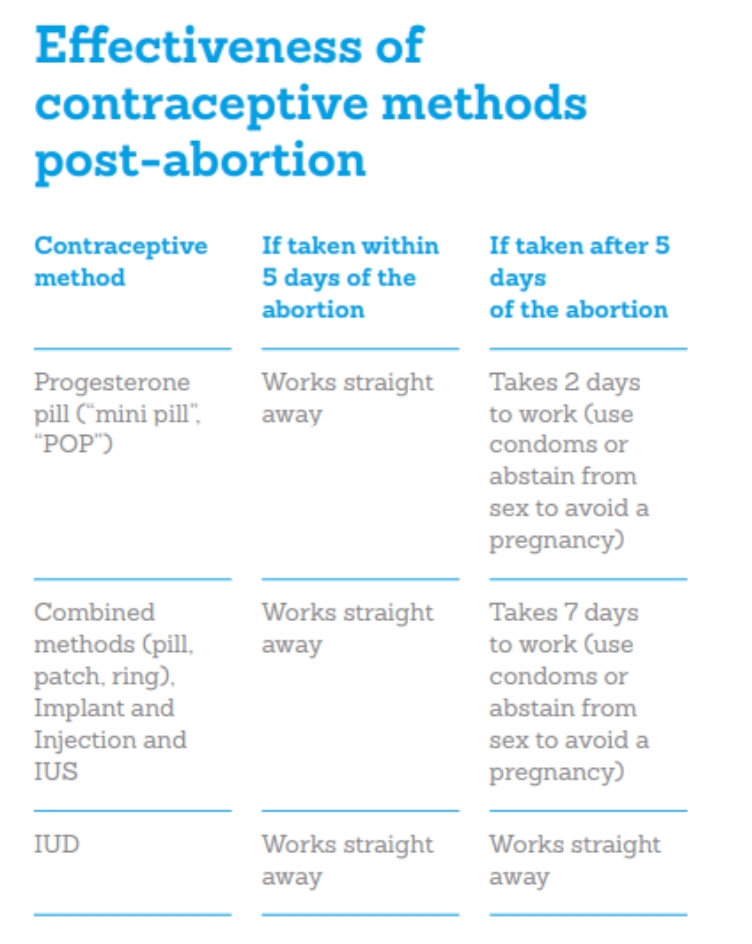
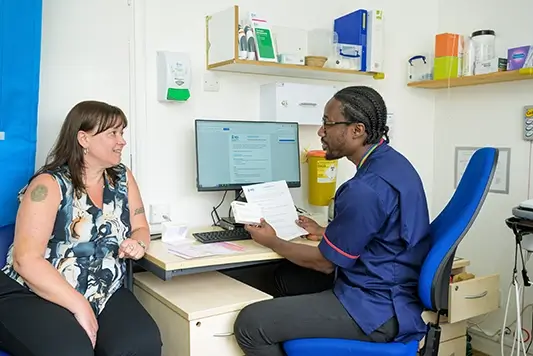
What will we discuss during your appointment?
As part of your abortion care, we will ask if you’ve thought about any plans for future contraception. You may choose not to have contraception as part of your treatment, or know exactly what method you’d prefer. If you aren’t sure which method you’d like but know that you do want to use contraception following your abortion, we will explain all of your options.
During your appointment with us, we will discuss things like risks, benefits, how each method might affect you, and what you can do if the method does affect you in a way you don’t like.
What to consider when choosing a contraceptive method
All methods will be discussed during your appointment with us, but there are a few things you might want to consider to help you choose the best option for you.
One important thing to consider when thinking about contraception is whether you’d prefer a method that you don’t have to remember or think about taking and replacing, or whether you’re happy to take and replace your method more regularly.
If you are happy to take contraception more regularly or every day, you may wish to start with a short-acting method of contraception like a contraceptive pill, the contraceptive patch and the contraceptive ring. If you’d like to use a short-acting method of contraception but don’t think you’ll be able to take a pill at the same time each day, the patch or the ring might be a good alternative (as they have to be replaced less often).
If you would rather not have to remember to take contraception every day and know that you do not want to get pregnant for a while, LARC (Long-Acting Reversible Contraception) methods (also known as fit-and-forget methods) might be best for you. These include the hormonal and non-hormonal coils, the contraceptive injection and the contraceptive implant.
Different contraceptive methods can impact your period in different ways, so you may be asked questions like: Are your periods manageable at the moment? Are they painful? Are they heavy? If you have painful or heavy periods, for example, you might want to flag this to the clinician who will advise on methods that can make your periods more manageable (or on methods to avoid). For example, the non-hormonal coil may exacerbate heavy or painful periods, whilst the hormonal coil or combined contraceptive methods (like the combined pill, the patch and the ring) might be recommended to support with heavy periods.
The combined pill gives you the option to skip or shorten your period. To skip your period, you can continue to take the next pack of pills when you finish your current pack. It’s important to know that not having a regular period as a result of contraception does not cause any harm, and is not a problem for you or your future fertility.
You may also want to consider the efficacy or effectiveness of each method at preventing pregnancy when choosing a contraceptive method. Each method has different rates of efficacy. You can find the efficacy of each method (both with ‘perfect use’ and ‘typical use’) on our long-acting reversible contraception and our short-acting contraception pages.
Different contraceptive methods can impact your hormones in different ways. The side effects of some hormonal contraceptive methods may include headaches, nausea, breast tenderness and mood changes.
If you’d prefer to use an entirely non-hormonal method of contraception, condoms or the non-hormonal coil may be a good option for you.
Whilst the hormonal coil releases a hormone called progesterone, this hormone is localised, and so it is less likely that you’ll experience the same sorts of side effects associated with combined contraceptive methods like the combined pill, patch or ring. Additionally, there are different doses of hormones in different types of hormonal coil – for example, the Mirena coil and Levosert has a higher dose than the Kyleena coil.
Types of contraception
Learn more about different types of contraception.
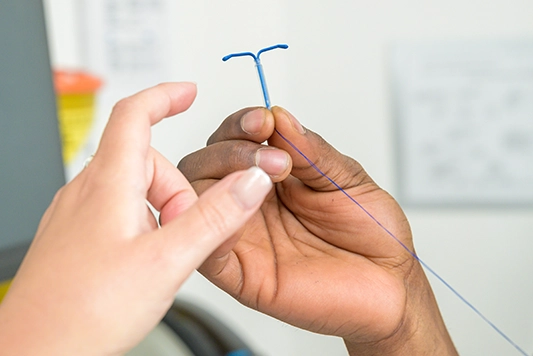
Long-acting contraception
Long-acting contraceptive methods include the coils, the injection and the implant.
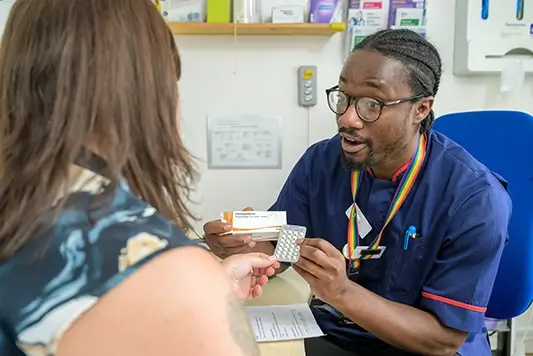
Short-acting contraception
Short-acting methods include the contraceptive pill, patch and ring.

Barrier methods
Barrier methods include condoms, diaphragms and caps.
“Choice”: MSI’s digital contraception counsellor
Contraception isn’t a one-size-fits-all approach. There are a range of methods to choose from, and a number of things that you can think about when deciding which method is right for you.
By using our “Choice” Contraception Counsellor, you can find personalised contraceptive advice. Simply fill out a questionnaire about your lifestyle, preferences, needs and medical history, and you’ll see a list of the most appropriate contraception options for you.
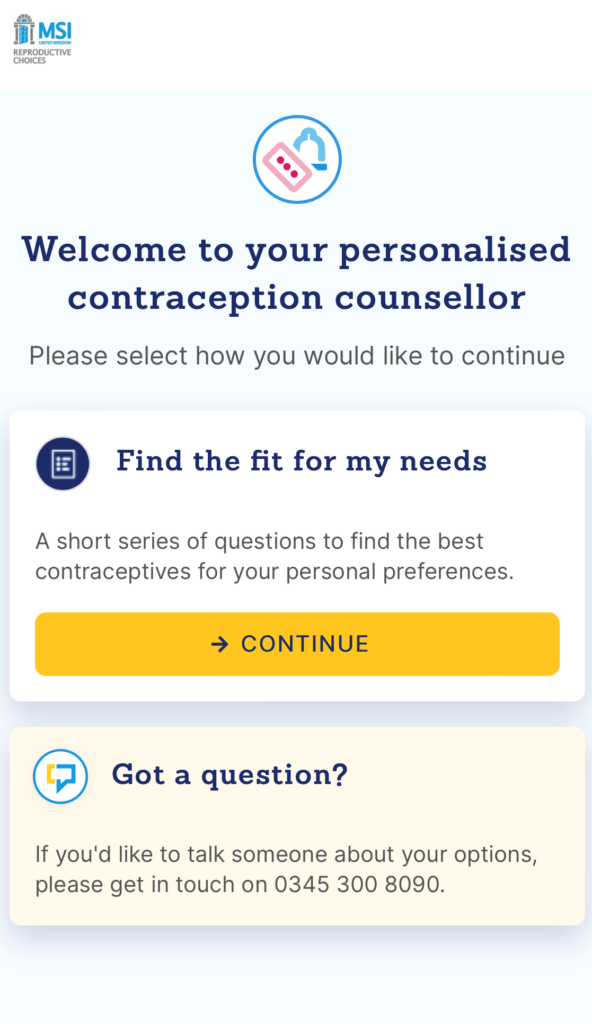
At what point does this appointment take place during your abortion treatment?
This depends on whether you’re having a medical abortion or a surgical abortion.
- Surgical abortion: During your surgical abortion care, the contraception counselling appointment will take place as part of your pre-assessment at the clinic. We can then arrange for contraception like the implant or coils to be fitted during or on the same day as your abortion treatment.
- Medical abortion with face-to-face appointment: If you are having a medical abortion with us, we will also talk about contraception during your pre-assessment at the clinic. Some contraceptive methods can be given or fitted during this appointment. If this isn’t possible – for example, if you’d like to have a contraceptive coil fitted – we can arrange a time for you to return to the clinic to have your preferred method fitted.
- Medical abortion telemedicine (pills by post): if you are accessing our at-home abortion services (telemedicine), this contraception counselling appointment will take place during your call with a nurse, who will arrange an appointment at one of our clinics should you wish to have a method fitted following your abortion. If, during this call, you decide that you would like to start taking the contraceptive pill (either the combined pill or the progestogen-only pill), this can be sent out along with your abortion pills. If you would like to access start another method (such as a coil, implant or injection), we will either arrange an appointment for you to have the method fitted (for the coils, implant or injection) posted to you (for the injection).
If you choose not to start a method of contraception during your abortion care or would prefer to go away and think about your options, call your GP or be in touch with a sexual health clinic, you will be able to access contraception services with us for six months following your treatment.
Coil fitting and pain management
The experience of having intrauterine contraception (such as the hormonal coil or non-hormonal coil) fitted differs from person to person.
Local anaesthetic can greatly reduce the discomfort felt during a coil insertion. At MSI UK, we offer anyone opting for a coil a choice of four types of local anaesthetic, including: an anaesthetic gel, spray, an injection and a cream, as well as suggesting the option of taking painkillers, such as ibuprofen, an hour or two before the procedure.
To read more about coil fitting and the anaesthetic options offered by MSI UK, read our blog on how to prepare for a contraception appointment.
Learn more about contraception
Visit the pages below to find a useful comparison tool to help you choose a contraceptive method that works for you, to learn more about MSI UK’s contraception clinics, and to find our online contraception counsellor.

Which method is right for me?
Find a contraception comparison tool that can help you find the right method for you.
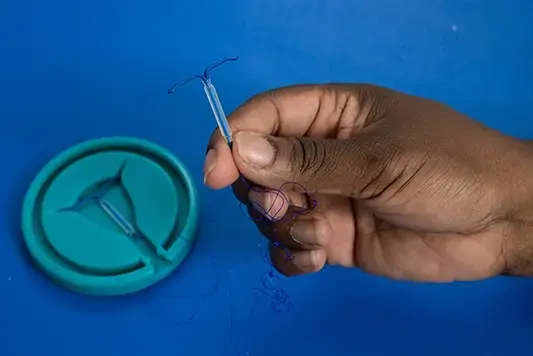
MSI UK contraception clinics
Here, people can access long-acting reversible contraception without having had an abortion.
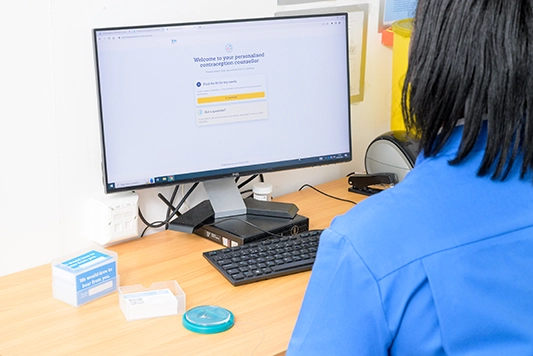
Online contraception counsellor
Answer a short series of questions to receive personalised contraceptive advice.




